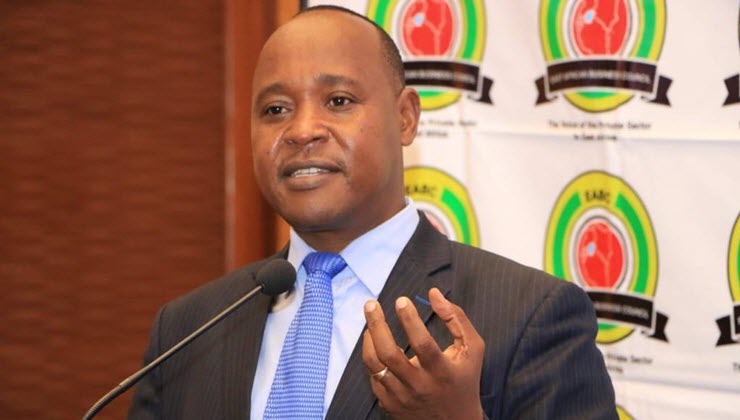The East African Community (EAC) economy will rebound in this year if EAC Partner States governments strengthen macro-economic policy coordination and adopt a regional coordinated approach in handling the COVID-19 pandemic.
COVID-19 disruptions in 2020 provided a learning curve, on the need to have sustainable EAC regional value chains integration for the development of finished products with a view of reducing industrial and trade risks arising out of external shocks.
EABC Chairman Mr. Nick Nesbitt noted that the region is projected to recover steadily but it was dependent on how the pandemic is handled.
According to the AfDB East Africa Economic Outlook 2020, the East Africa region is projected to recover to 3.7 percent in the baseline scenario and 2.8 percent in the worst-case scenario under the assumption that COVID-19 would be contained in the short-to-medium term.
Speaking during a media engagement on the State of EAC Economies amid the pandemic in Nairobi, Mr. Nesbitt emphasized the need for the EAC secretariat to fast-track a regional harmonized approach to promptly facilitate interventions at EAC border points to unclog trade blockages and facilitate faster clearance of goods.
EABC has been emphasizing the need for EAC Partner States to harmonize COVID-19 related charges and stop testing at border posts to avoid delays in truck and cargo clearance.
This year, East Africa’s inflation is projected to stand at 15.4 percent in the baseline scenario and 16.0% in the worst-case scenario. This, with Kenya’s inflation, projected to stand at 4.9 percent in the baseline scenario and 4.6% in the worst-case scenario in 2021 (AfDB).
EABC CEO, Dr. Peter Mathuki noted that macro-economic policy coordination in the EAC with a tighter monetary policy stance is necessary, to control inflationary pressure and foreign exchange volatility.
“Containing inflationary pressures will reduce the overvaluation of national currencies and improve export competitiveness,” he said
Dr. Mathuki noted that while it was critical for Kenya to sign an Economic Partnership Agreement (EPA) with the UK, to avoid losing out on trade, the region’s enjoinment to the deal will enable the bloc to export larger volumes of goods and enjoy economies of scale by marketing as one investment destination.
“It is more beneficial if the EAC region is marketed as a single investment destination,” he said.
Dr. Mathuki urged EAC Partner States to take advantage of the new USA Government and approach it with a bid to revive the negotiations and implementation of the EAC-US Trade and Investment Partnership which were stalled since 2016.
“Given that both US and EAC have already agreed on some areas under EAC-
US Trade and Investment Partnership, the approach will aim at enhancement of the implementation of the agreed areas and move forward on areas this two parties have not agreed,” Dr. Mathuki added.
He further appreciated TradeMark East Africa (TMEA) for the continued partnership and support to the East African Business Council towards advancing Public-Private Sector Dialogue and safeguarding intra-EAC trade & investments amidst COVID-19.
The meeting was also attended by regional business leaders and other development partners.










